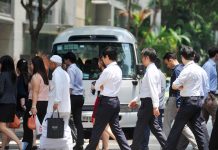Malaysia’s labour productivity grew 3.6% to RM85, 031 in Q4 2017 following the 4.1% growth (RM82,433) in Q3 2017. For the year as a whole, the country’s labour productivity growth stood at 3.6% (RM81,039) compared to RM78,244 in 2016. This is a continuous improvement following the growth of 3.5% in labour productivity recorded in 2016. In the period of 2010-2016, labour productivity grew by an average of 2.2%.
In Q4 2017, across all economic sectors, agriculture recorded the highest labour productivity growth of 4.8%, followed by mining and quarrying (4.7%), services (4.7%), manufacturing (3.6%) and construction (1.4%). The 11th Malaysia Plan (2016-2020) has set a target of 3.7% labour productivity growth. To date, Malaysia has achieved 87.8% of the targeted level of RM92,300 labour productivity by 2020.
In the period of 2014-2017, the growth in Malaysia’s GDP has been increasingly driven by the growth in labour productivity rather than the increase in employment. On average, labour productivity grew by 3.5% while employment increased by 1.5% in the last four years. Minister of International Trade and Industry, Dato Seri Mustapa Mohamad said Malaysia could expect continuous improvement in labour productivity, especially with the implementation of the Malaysian Productivity Blueprint last year which aims to shift the approach to productivity from the primarily Government driven initiatives at the national level to targeted action across the public sector, industry players and individual enterprises.
Six priority initiatives are being implemented under the five strategic thrusts at the national level. The thrusts include: building a workforce of the future which meet changing needs across the sectors; driving digitalisation and innovation through the adoption of innovative technology; making industries accountable for productivity through productivity metrics and outcome, forging a robust ecosystem that addresses regulatory constraints; and securing a strong implementation mechanism that will inculcate a stronger culture of productivity throughout the economy.
At the same time, the Government through MPC’s Modernizing Business Regulation Programme and The Special Task Force to Facilitate Business (PEMUDAH), is addressing regulatory constraints to improve the competitiveness of enterprises working in Malaysia as well as developing a robust accountability system to ensure positive and effective implementation of good regulatory practice.
Dato Seri Mustapa said that in the last 5 years, a total of RM6.1 billion of compliance cost savings has been achieved through various improvement programmes such as Reducing Unnecessary Regulatory Burden (RM3 billion) and process innovation projects such as Lean Management (RM3.1 billion). He stressed that improvement of labour productivity required the commitment from all parties to continuously undertake the structural steps and reforms needed. On this, he added that the government has embarked on public-private collaboration where the Government plays an enabling role while the private sector is in charge of the implementation efforts in nine key sectors. These sectors which have been identified as the productivity nexus consist of Retails & F&B, Agrofood, Chemicals and Chemical Products, Electrical & Electronics, Machinery & Equipment, Private Healthcare, Professional Services, ICT and Tourism. The governing committees led by members from the private sector comprising highly skilled and specialised individuals have been established to implement the 43 initiatives outlined in the Malaysia Productivity Blueprint. He said the success in driving greater productivity in these nine sectors will pave the way for more sustainable productivity growth across the economy including for SMEs.
Dato Seri Mustapa pointed out that despite the steady productivity growth over the last few years, it is still a work in progress and more needed to be done to boost productivity which will be the key for Malaysia to attain the high income nation status by 2020.
Source: Ministry of International Trade and Industry, Malaysia





















